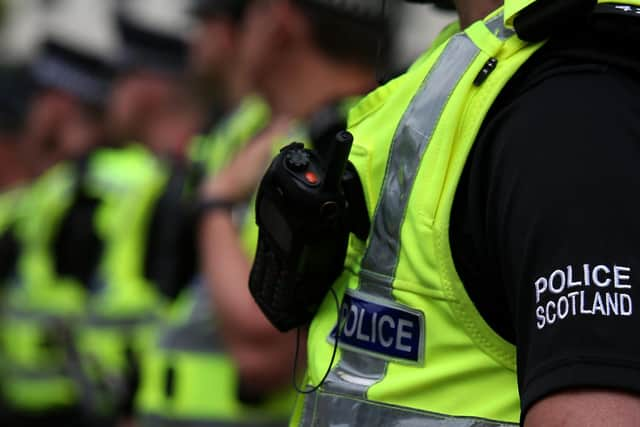Exclusive:Hate crime laws Scotland: Warning people could be wrongly charged amid claims Police Scotland 'unprepared' for new law
SNP ministers have been warned that people could be wrongly charged under new hate crime legislation because officers are “unprepared” to enforce the legislation.
The Hate Crime and Public Order (Scotland) Act will come into force on April 1 and will create new stirring up of hatred offences for protected characteristics, including age, disability, religion, sexual orientation, and transgender identity, alongside pre-existing offences for racism.
Advertisement
Hide AdAdvertisement
Hide AdBut the union for rank-and-file officers in Scotland has raised concerns that mistakes could be made in interpreting the law because cutbacks have left officers with inadequate training ahead of the new policy being rolled out.


The row comes amid controversy over "third party reporting centres", which have been set up in locations including a sex shop and mushroom farm, as well as libraries and council offices.
David Kennedy, the general secretary of the Scottish Police Federation (SPF), told The Scotsman the online training packages that officers had undertaken were “just not going to be good enough”.
He said: “In years gone by, there had been a proper training course. You don’t get that from an online training exercise. We have stated previously that the online training is not fit for purpose.”
Mr Kennedy added: “Police are going to be inundated with people wanting to report a hate crime. We need to make sure the public understand the Act. It certainly won’t be an easy Act to understand.”
Mr Kennedy warned “the police are overstretched as it is”. He added: “People will expect certain actions to take place into the policing of the hate crime laws.”
For many years, members of the public have been able to report hate crimes through third party reporting systems, but concerns have been raised over accurate data and reports.
Mr Kennedy said: “Third party reporting has been there before. But you’ve then got to get the statements from the right people and that can be an issue.
Advertisement
Hide AdAdvertisement
Hide Ad“We could end up with people being charged who should not be charged because people do not understand the law. We are asking officers to police a law that they are unprepared for. And that’s where mistakes will happen.”
The SPF chief added: “There’s serious concerns about the whole policing in communities and it’s down to lack of money and investment. It could be a recipe for disaster.”
A Police Scotland spokesperson said: “Our training package has been developed in close consultation with diversity staff associations to ensure all protected characteristics under the new Act are clearly represented and articulated, and that officers are best prepared when they respond to hate crimes and incidents.
“In addition to the training package, an extensive programme of workshops is taking place to allow officers to gain more understanding and ask any questions they may have. We know it can be hard for people to report a hate crime and in some cases to even recognise or acknowledge they have been a victim.
“Hate crime can be verbal or physical and can take place anywhere, including online. We want everyone targeted by hate crime, or those who witness it, to have confidence to come forward. They can be assured they will be treated with dignity and respect, and that the circumstances they report will be fully investigated.”
The criticism comes less than a week after Police Scotland were forced to separately defend plans for the nationwide rollout of a controversial new policy that means some minor crimes will no longer be investigated in order to free up resources.
The force has recommended the proportionate response policy should be rolled out across Scotland on a phased basis, subject to ongoing engagement and evaluation.
Assistant Chief Constable Emma Bond has said the shift was “not a policy of non-investigation” and was not “about saving money”.
Advertisement
Hide AdAdvertisement
Hide AdA Scottish Government spokesperson said: “The new laws tackle the harm caused by hatred and prejudice and provide greater protection for victims and communities as we know impact on those at the receiving end of physical, verbal or online attacks can be traumatic and life changing.
“We have worked with partners to ensure effective implementation of the legislation, which has provided time to complete a number of IT change programmes and for the delivery of a robust package of training and guidance for police officers, which will support implementation.
“There has been regular engagement with stakeholders who have helped to shape the delivery content for police personnel that may come into contact with victims of hate crime or may be subjected to hate crime themselves.
“Training of police officers is an operational matter to Police Scotland with whom we will continue to work closely. Despite deeply challenging financial circumstances due to the UK government settlement, our Budget for next year includes record police funding of £1.55 billion – an increase of £92.7 million.”